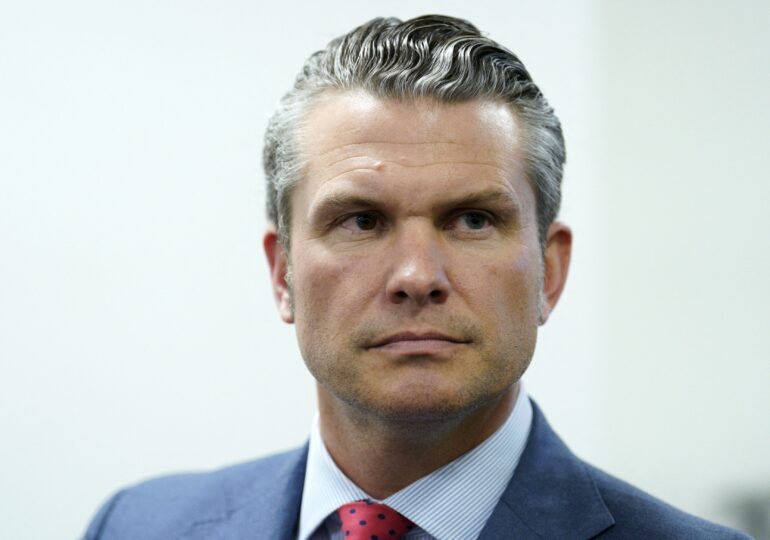The White House is looking for a new chief of staff and several senior advisors to support Defense Secretary Pete Hegseth after a series of mistakes that have shaken confidence in his ability to lead the Pentagon.
But so far, suitable candidates have not been found, NBC News reports.
Top positions in the Department of Defense, including the chief of staff to the Defense Secretary, are usually prestigious and attract many qualified candidates.
However, according to a former American official, a defense official, and a person familiar with the matter, at least three people have already turned down these potential roles under Hegseth's leadership.
- Pentagon Chief Shared Classified Information in Chat Group with Wife and Brother
- Trump Supports Pentagon Chief Despite Sharing Classified Information in Chat with Wife and Brother: Pete is Doing an Excellent Job
Vice President JD Vance and White House Chief of Staff Susie Wiles have been actively involved in finding solutions to help Hegseth after he abruptly suspended two carefully selected senior advisors in April, accusing them of leaking classified information in an interview with Fox News.
Shortly thereafter, Hegseth announced the dismissal of his chief of staff on Fox News, and a senior press advisor resigned, later writing that Hegseth's office is in "total chaos."
Vance, Wiles, and others have since been looking for candidates who could support Hegseth, according to three current American officials and a former American official.
However, the administration has not had much luck in identifying individuals willing to work for Hegseth or who align with him politically.
The White House has rejected some individuals Hegseth wanted to hire, while Hegseth, in turn, has rejected some White House candidates, NBC News reports.
Vance, Wiles, and others have been looking for candidates for Pentagon positions in some traditional places, including within the White House and on Capitol Hill, according to NBC News sources. Some candidates have been deemed politically problematic.
For instance, the White House personnel office disqualified some candidates for not being "MAGA enough," according to a former American official and a current American official familiar with the process.
An Unexpected Purge
When they arrived at the Pentagon earlier this year, two senior advisors to Hegseth, Dan Caldwell and Darin Selnick, were considered close allies of his - former colleagues, even friends, whom he had brought in to fill key positions. Caldwell was Hegseth's senior advisor, and Selnick was his deputy chief of staff.
But in April, Caldwell and Selnick, as well as Colin Carroll, chief of staff to the Deputy Defense Secretary Stephen Feinberg, were escorted out of the Pentagon by security agents in connection with an investigation into allegations of leaking sensitive information.
In a joint statement, the three described their treatment as "reckless" and claimed they were not provided with any information about the investigation, the allegations of leaking information, or the evidence found.
Less than a week later, the turmoil around Hegseth escalated. The New York Times reported that he had shared sensitive information about an ongoing US military operation in Yemen in a Signal conversation involving his wife, personal lawyer, and brother, among other close individuals.
The revelation came a month after National Security Advisor Mike Waltz mistakenly added the editor-in-chief of The Atlantic to a separate Signal chat group with Hegseth, Vance, and other senior administration officials focusing on the same military operation in Yemen.
Two days after the NYT article was published, Hegseth appeared on Fox News and accused Caldwell, Selnick, and Carroll not only of leaking information while employed at the Pentagon but also of providing information about the Signal chat to the newspaper. Hegseth did not publicly mention what evidence he had against them.
Distrust
The drama continued in May when White House officials removed Hegseth and his personal lawyer, Tim Parlatore, also a Marine official, from overseeing the investigations into the three suspended advisors, according to a current official and a person familiar with the investigation.
White House officials transferred the investigation responsibility to Deputy Defense Secretary Stephen Feinberg, who would normally oversee such an investigation. According to two sources familiar with the investigation, this move was a sign of growing distrust in Hegseth's ability to objectively handle the investigation of his former assistants.
As no evidence emerged against the former aides and it became increasingly clear that the three men were not guilty of leaking information, administration officials began to question whether their dismissal was hasty, said two former administration officials and a current official.
Meanwhile, internal struggles among Hegseth's remaining advisors have continued. And Hegseth himself remains largely isolated, relying on a small group of advisors.

